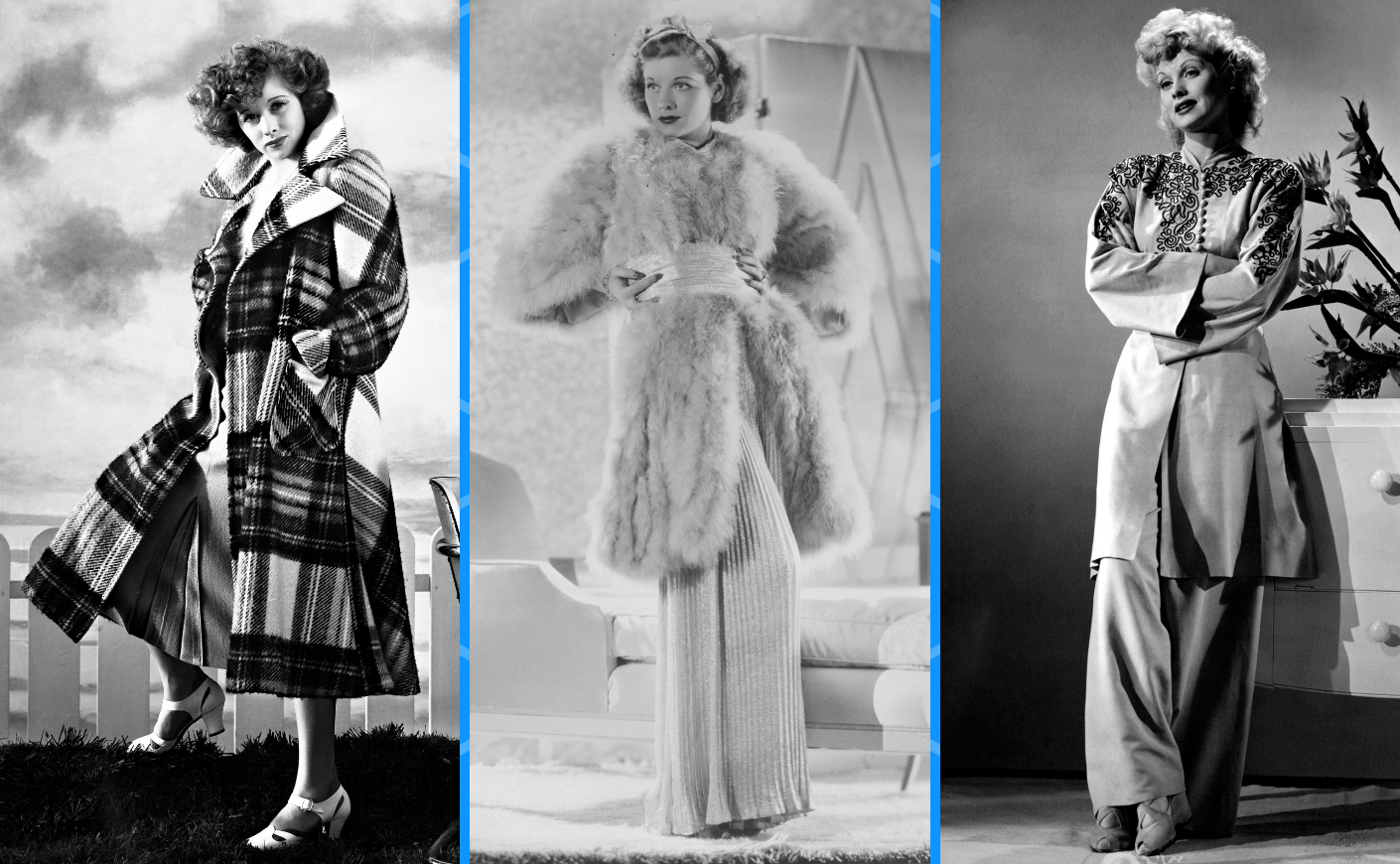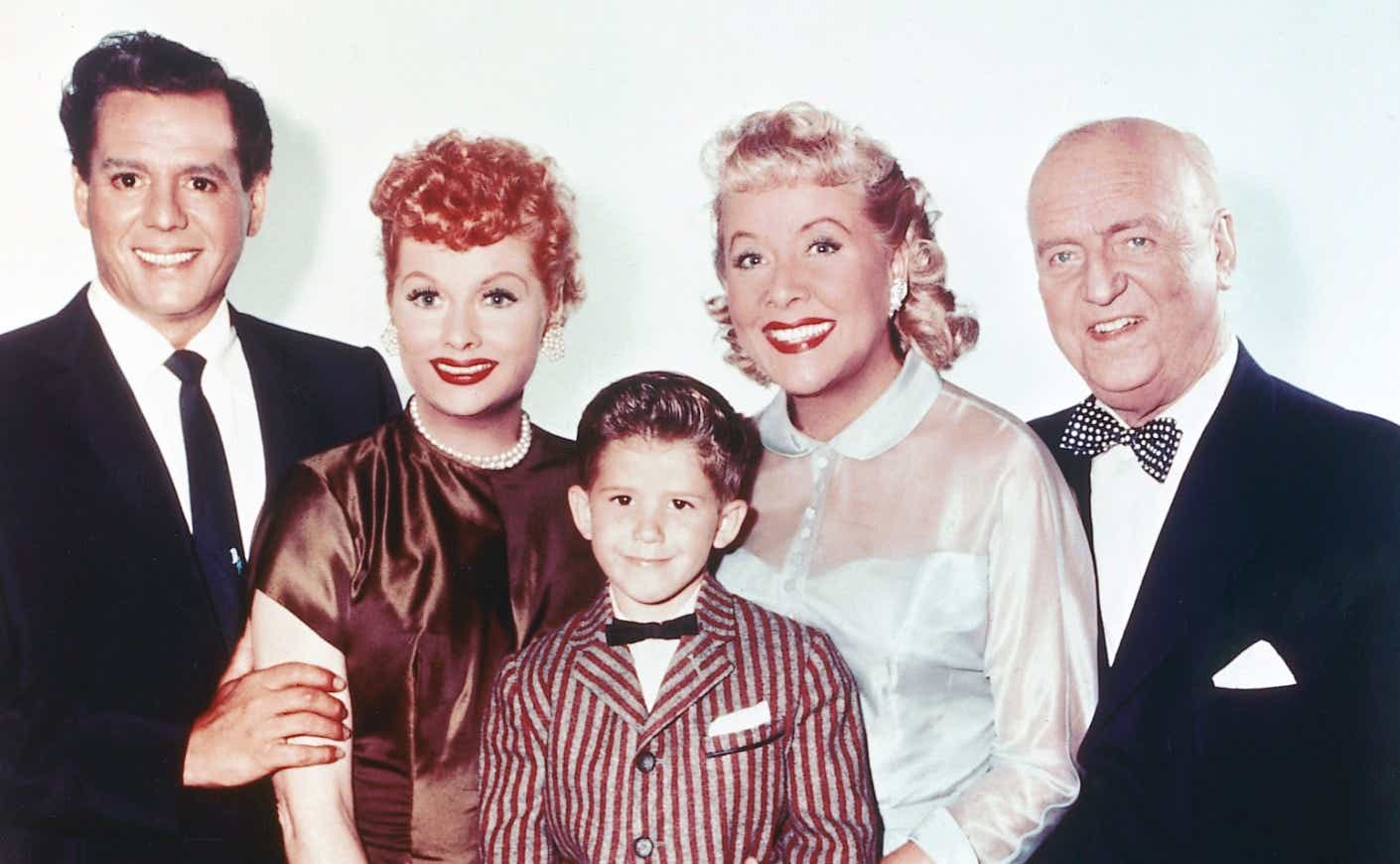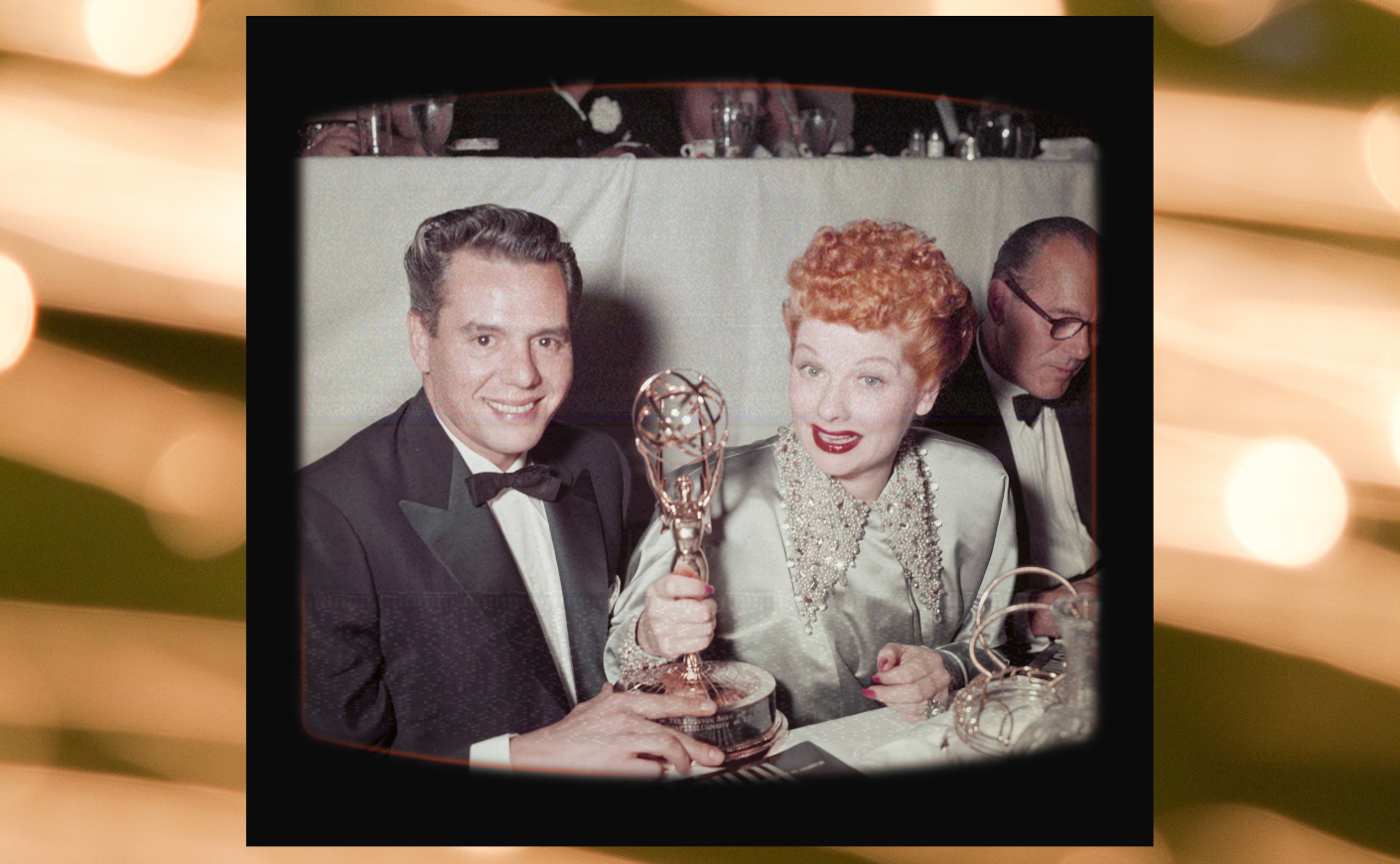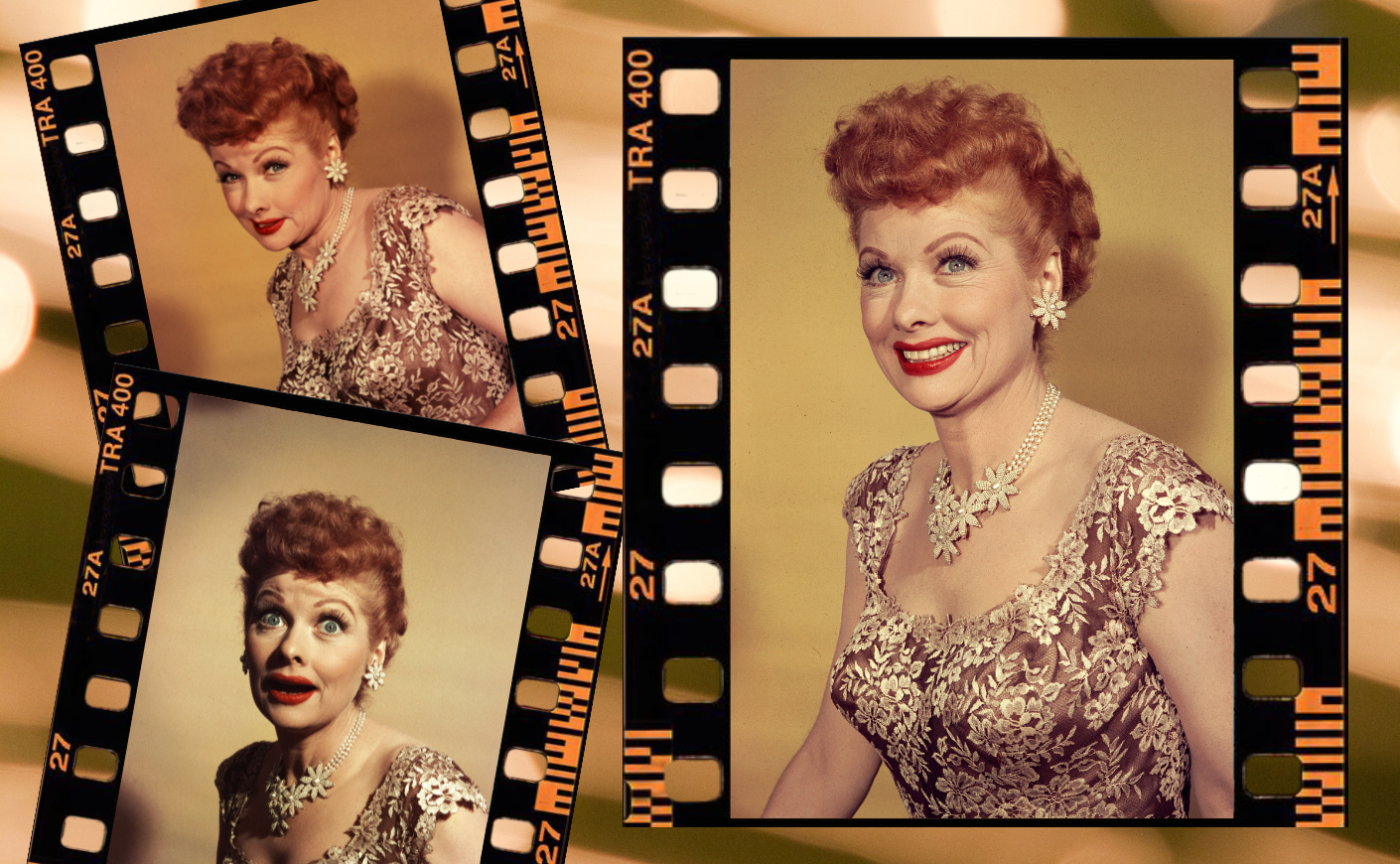This month marks 70 years since the 1951 premiere of I Love Lucy, but the redheaded comic genius at its center still feels as relevant to our culture as ever. Lucille Ball lived quite the life, creating some of the funniest television scenes of all time and building a personal and professional relationship with husband Desi Arnaz that continues to fascinate us decades after their deaths.
It’s a good time to be a Lucy fan. Nicole Kidman is set to play her in the soon-to-be-released Aaron Sorkin film Being the Ricardos, and Amy Poehler is directing an upcoming documentary about Ball and Arnaz's marriage. But you don’t have to wait to take an engrossing deep-dive into all things Lucy. The latest season of the TCM podcast The Plot Thickens, which is releasing new episodes now through Dec. 14, examines her life thoroughly and insightfully, featuring stories you don’t know and recordings of Lucy you haven’t heard.
If I Love Lucy is the way you know her best, you’re in for lots of surprises that will change your understanding of this American icon. The Plot Thickens is full of compelling showbiz tales, but it also uncovers gripping details of Lucy’s early life. For example: Before she was 10, she’d lost her father and her grandmother, was separated from her mother for three years, and lived in eight different places. Her first love was a 21-year-old bootlegger who Lucy began dating when she was just 14. And at 15, she attended a drama school in New York City where one of her classmates was none other than screen legend Bette Davis.
To get even more little-known Lucy facts and the stories behind them, we checked in with the podcast's host, Ben Mankiewicz. He's an expert on all things Hollywood: a film critic, the face of Turner Classic Movies, and the grandson of Herman J. Mankiewicz (the co-writer of Citizen Kane and subject of the 2020 David Fincher film Mank).
Mankiewicz says working on the show brought with it a thrill of appreciating Lucy in a deeper way. The story is told through many sources, including “interviews that nobody has heard, where Lucy is enormously candid about her career.” The podcast highlights her obsession with perfection, her daring approach to her work, and the unconventional path she took to success. After all, I Love Lucy didn’t come along until she’d already been toiling for years, trying to establish herself as a movie star.
“She took the risk of reinventing herself as a 40-year-old actress,” Mankiewicz tells KCM. “When everybody else at the time was running away from TV, she ran toward it. She fully embraced it — and then it gave her a second act in movies, too.”
Our conversation is just a taste of the deeply-researched reporting you can expect in The Plot Thickens. Turns out there's a whole lot of depth behind the zany character we all love so much.

KCM: What was the most surprising thing you learned about Lucy while working on this podcast?
Ben Mankiewicz: With someone like Lucy, we’re all pretty sure we know what she was like, right? It’s like my father used to say about John Wayne: “We think John Wayne’s a hero, but he just plays heroes.” So it was learning all of Lucy’s incredibly complicated humanity, which shatters the myth — not in a bad way. We’re not knocking her down to size; we’re completely humanizing this person who everyone thinks they know because she’s wacky. And she wasn’t wacky. She was unbelievably funny, unbelievably smart, unbelievably talented, and driven in a really impressive way. And she was able to overcome significant tragedy and heartache and keep going. It’s the complete fullness of her character, strengths and flaws, which ultimately makes me like her more.
Lucy spent many years really struggling with money, then became an incredibly wealthy and successful person. How did her relationship with money influence her?
She wasn’t quite a child of the Depression because she was so much older by the time it hit, but she saw what it did to her grandfather. [Editor’s note: Lucy was 18 when the Great Depression began in 1929.] And Lucy had these abandonment issues. Her father died, and her mother left and came home with another guy. So Lucy developed this real need to keep the family together — finding a place for them to all live in L.A., and living with them while she found early success before she went out and got her own place. Her relationship with money was that when she got money, she was going to use it to make sure that she did not suffer what she suffered as a kid, which was this sense of unease and loss. She was going to create stability.
We know Lucy best as a redhead, but she was born brunette and also went blonde in her early career. What does her changing hair color tell us about her?
She had really strong control over that image. Du Barry Was a Lady [the 1943 film] is the first time we see her in color — the first time we get a look at the red hair — and it works. We live in a world where we think being a redhead is funny. And being a redhead in 1951, when I Love Lucy went on the air, was not as sexually provocative as being a blonde. And Lucy got that. Here’s this woman who’s strikingly beautiful and sexy, and she doesn’t look like everybody else. But she willingly and eagerly frumped herself up for I Love Lucy, as did Vivian Vance [who played Ethel Mertz]. I think Lucy had a real sense of what made business sense. She wasn’t hung up on being beautiful on that show. She knew what worked: being funny, being silly, and being a redhead. She wasn’t in control of it on Du Barry Was a Lady, but once it worked, she stuck with it.
Speaking of Vivian Vance, on screen they famously played best friends, but there’s been speculation about whether they really got along, and whether Lucy made Vivian look more dowdy so Lucy could be the glamorous one. What was the nature of that relationship?
Vivian Vance was beautiful also, which Lucy didn’t love. It’s hard to be a beautiful actress and then make yourself less attractive, and then have another beautiful actress come in. But they dowdied both of them up, so I don’t make much of that. Most of the tension on that set, to the extent there was tension, revolved around William Frawley [who played Fred Mertz]. Vance didn’t like Frawley. Nobody liked him, it seems.
But the fact that Vance is back on Lucy’s later shows [1962’s The Lucy Show and 1968’s Here’s Lucy] indicates everything that’s important to know about that friendship. Whatever might have been between them, they got beyond it, and they were close. Lucy had her pick of actors to bring in on her later shows, and bringing in Vance suggests that she understood Vance made the shows better.

It was a big deal in 1951 to cast Lucy’s real-life husband, Cuban bandleader Desi Arnaz, as her on-screen spouse. What gave Lucy the courage and the power to make that decision?
The power comes with success. It was the success of My Favorite Husband, her radio show, and CBS’s desire to make this show at a time when they’re trying to figure out what TV is. So she had some leverage. They wanted to make the show with her, but she didn’t want to use Richard Denning, her radio husband. She wanted to use Desi.
There are two reasons for that, but only one of them really matters. First, she wanted to keep an eye on her husband. She knows what his tendencies are, and if he’s out working nights at a club and she’s doing the show, it could cost them the marriage. But that’s the unimportant reason. She also recognized that Desi was important for the show. The argument [against casting him] was, “You’re going to be married to a Cuban immigrant? No way. A brown man and a white woman?” And, of course, Lucy said, “But I am. He’s my husband.” That idea of, “You mean a white woman could be with a man who’s not white?” — it’s insane, but it might have been a conversation even in 1991, and this is 1951, and she won. It’s stunning, and it suggests how much CBS wanted this show and how much they wanted it with her.
What was Lucy and Desi’s relationship like over the years?
She knew how talented and funny he was — it wasn’t just the way he looked, though they connected instantly and had intense chemistry. It occasionally worked against them, because their fights were legendary. But they always made up, and they clearly loved each other, as evidenced by their conversations late in life. I think they were pleased to be done with each other, but they were very much connected.
Their relationship was such a defining part of their lives, not only personally but professionally. What was the power balance between them in their work?
It was pretty even. I mean, look, the show’s called I Love Lucy, so there’s that. [Film producer] Pandro Berman made the attempt to placate Desi by saying, “You’re the ‘I’ in I Love Lucy.” That’s not how you placate a talent like Desi — he didn’t love that. But he accepted it. And he never stopped working to make the show better. He understood how they should do this show. He brought in [cinematographer] Karl Freund to figure out how to shoot it, and they set the template for hundreds of sitcoms since. That’s why it’s been preserved. Otherwise, you would have had a show shot on kinescope that almost certainly would not have existed as it has over the last 60 years in reruns because it would have looked like crap. But it didn’t — because of Desi. Lucy was a huge star back then, but she continued to be because of the success of those reruns, and that’s Desi. He got it. So I don’t know if there was a dramatic power dynamic. Lucy and Desi were a really good partnership.

The average person knows Lucy best for I Love Lucy, but she continued to have a successful career after that show and after she divorced Desi in 1960. What’s your takeaway from her later years?
Well, there’s some sadness to it because she should have been celebrated more in her later years. There’s a sense that she was a little lonely. But I look at those other shows: The Lucy Show and Here’s Lucy ran for six seasons each. Those were very successful shows — only “not successful” by the impossible-to-reach standard of I Love Lucy. She unquestionably proved she could succeed without Desi, and she had this great business acumen.
There’s a story Carol Burnett tells in the podcast. Carol became friends with Lucy, and they were close. Carol said she was doing one of those later shows, and they were having a table read. Things weren’t right, and Lucy got mad. She was like, “What the hell is this? It’s wrong. None of this is working, and we’re supposed to shoot this in four days? It’s crazy.” So Lucy went to lunch with Carol and said, “Yeah, I kind of yelled at them, but they’re going to fix it. It’s tricky — the Cuban used to handle all this stuff.” But he wasn’t there, so she figured it out. She was a powerhouse in this industry.
As someone who had such a high standard for herself, what did Lucy think about her legacy before she died?
I’m going to do the thing that I hate when people do when I’m interviewing them, but I want people to hear the end of the podcast for that. But you’re asking the right question: Did Lucy love Lucy? And did Lucy get how much all of this mattered? It’s a really interesting part of her story, and it’s a question that we try to answer.
Episodes of The Plot Thickens are available to stream right here.









